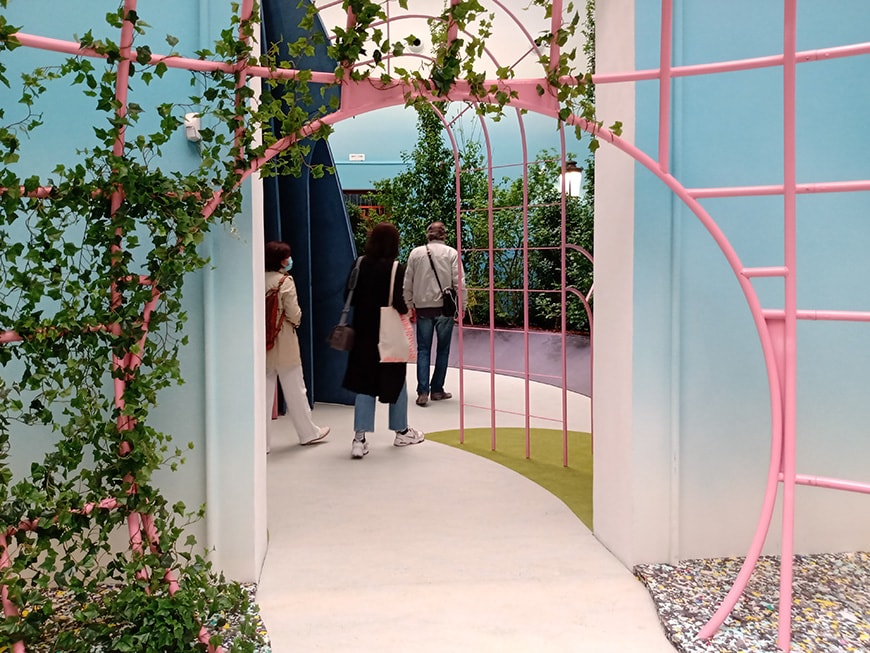Above: The Garden of Privatised Delights, the UK Pavilion at the 17th Venice Architecture Biennale, installation view; photo © Federica Lusiardi / Inexhibit.
The Garden of Privatised Delights – UK Pavilion, Venice Architecture Biennale 2021
Titled “The Garden of Privatised Delights”, the UK exhibition at the 17th Venice Architecture Biennale investigates how we will live together in a context of increasing privatization of
public spaces, a situation recurrent worldwide but especially common in the United Kingdom.
“Privatised public space is widely associated with gated squares in new
developments, yet it is a typology that is rooted in British culture,
from interior spaces like the pub to networks dependent on multiple
public and private uses like the high street. “
Curated by Manijeh Verghese and Madeleine Kessler, whose proposal has been selected through an open call, the exhibition comprises seven “rooms”; the curators’ practice, Unscene Architecture, designed one of the rooms, while the others were created by six British multidisciplinary teams and creative offices (Built Works, Public Works, Studio Polpo, The Decorators, and vPPR).
“The global pandemic and associated lockdowns have highlighted the importance of accessible
public space and the existing inequalities within society. To explore how to redress these imbalances, the British Pavilion is transformed into a series of immersive spaces under threat like the youth centre, and inaccessible enclaves like the garden square, each overlaid
with proposals for how they can be re-programmed, revitalised and opened up.” Manijeh Verghese and Madeleine Kessler say.
Designed by Unscene Architecture, the first installation in the UK Pavilion, entitled Garden of Delights, is a small fenced garden that seems at first impossible to access without a key. Only after visiting the other rooms of the pavilion, visitors can access it. “Now, instead of being exclusive, it is transformed into an inclusive garden of delights, with places where you can play, grow produce, cook, work, meet, and contemplate”. Photo © Riccardo Bianchini / Inexhibit.
Publicani, the installation by The Decorators, is a celebration of a real institution of British culture: the pub. Yet, this institution, which has provided socializing spaces for many people in the UK for centuries, is rapidly declining; due to social changes and, more recently, to the pandemic, more than a quarter of Britain’s pubs have closed their doors in the last twenty years. Photo © Riccardo Bianchini / Inexhibit.
Built Works’ Ministry of Collective Data focuses on how AI and tracking technologies such as facial recognition increasingly monitor our access to public space. Entering the room, the visitors have two possible choices: if they walk right, their behaviors will be recorded to create a digital avatar in the virtual public space; if they walk left, they will keep their personal data and identity secret. Photo © Riccardo Bianchini / Inexhibit.
Ministry of Common Land by Public Works is a call to action to architects and citizens to challenge the enclosure of land for the profit of the few. Photo © Riccardo Bianchini / Inexhibit.
Designed by vPPR, Play with (Out) Grounds points the finger at the lack of public spaces for teenagers; as the authors write: “Too old for the playground, too broke for the cafe, too young for the pub; teenagers are ignored in the design of public spaces. This absence of spaces specially designed for teenagers is leading to the progressive marginalization of young people, a marginalization that has been further exacerbated by the pandemic. Photo © Riccardo Bianchini / Inexhibit.
